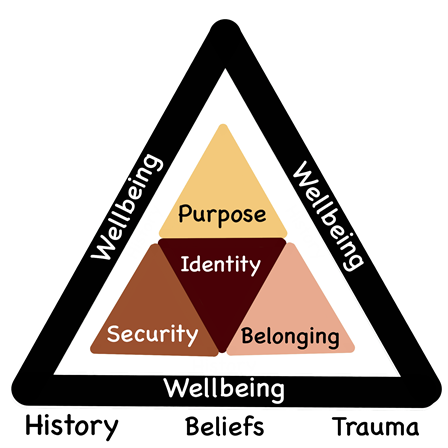by Bernie Goulding
‘Where do you come from?’ ‘What are ya?’ ‘You don’t belong here!’ ‘Go back to where you came from!’
Australia is a wonderful example of successful multiculturism, but 20% of our citizens still regularly experience racism, including physical assaults. The numbers are much worse for children, with four out of five children born in non-English speaking countries experiencing racism at school every month.
We are asked constantly, ‘Where do you come from?’ or told, ‘Go back to where you came from!’ Add to this, the impact of subtle racism and discrimination, the facial expressions, body language and low level incivility which features in the 93% of communication that is non-verbal. The message that comes through loud and clear is, ‘You don’t belong,’ and, ‘You’re not good enough.’ Identity and cultural confusion are often part of the journey for people of colour. Disconnection and historical trauma can be devastating to the wellbeing of children and adults who do not feel like they belong at school, work or in their communities.
So how can we support people of colour who feel they are forced to ‘play the game and put their armour on’ if they want to be accepted and succeed in Western (predominantly white) society? Hundreds of students and employees I’ve worked with over the past two decades, confirm their stress curve or mental health continuum is in the orange zone the moment they leave home. They report the exhaustion of having to balance being on alert, without being perceived as defensive. They put up with subtle incivility, outright racism and physical assault risk, everyday. It doesn’t take much to trigger their fight, flight, fright, freeze response which can result in conflict, disengagement, aggression, violence and mental and physical illness.
Thirty years of learning and lived experience with Pacific Indigenous communities, helped build my senses of identity and belonging as a Fijian Australian and inspired the creation of the Wellbeing Triangle. The triangle provides a framework to unlock the matrix of colour and cultural understanding for people struggling to fit in at school, work and in community and can help turn wellbeing risk factors into wellbeing protective factors and encourage people of colour to embrace their tribes and be empowered by being different. I wrote ‘Colour Outside The Lines, One Girl, Two Tribes,’ to help people of colour develop the very real superpower of cultural fluidity, the ability to walk between cultural worlds. To date, ‘Colour Outside The Lines,’ has travelled to over 25 countries in Oceania, the Middle East, Africa, Europe and North America.
In 2019, the International Year of Indigenous Languages, Diversity Network Australia DNA) was established, a social enterprise which shared stories written by Pacific people. We assembled a group of Indigenous children, young people and elders of all abilities, from across Oceania. Together we wrote, ‘Children of the 12 Tribes,’ a collection of artwork, stories, poems, letters, language lessons and Articles from the UN Declaration of the Rights of Indigenous Peoples, woven together in a story that began 65,000 year ago. ‘Children of the 12 Tribes,’ is now an Amazon best seller.
 DNA Wellbeing Temple
DNA Wellbeing Temple
We now publish our own planners, tailored for Indigenous people with beautiful artwork, snapshots of history, cultural facts and bite sized language lessons from many of the world’s most endangered Indigenous languages. DNA has also partnered with the Learning Curve and launched Australian best seller, The Wellbeing@Work Journal, a valuable resource for those looking to create a mentally healthy workplace and promote a positive culture at work.
Diversity Network Australia now has its own Cultural Academy and offers a suite of practical diversity and wellbeing webinars and workshops that can be tailored to individual needs. Our trainers and speakers have lived knowledge, experience and success in creating genuine diversity, inclusion and wellbeing at school, work and in community.
DNA is committed to ‘empowering people of all cultures and colours, one story and one tribe at a time.’ We share 50% of all profits with community partners in Timor Leste, Papua New Guinea, Australia and Fiji.
For more information, please visit www.diversitynetwork.com.au.